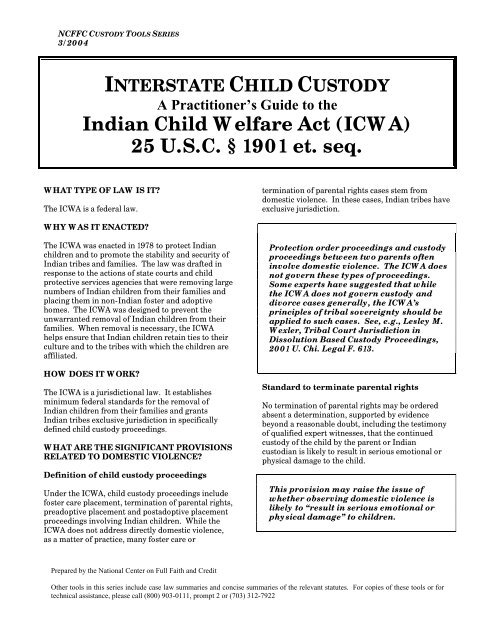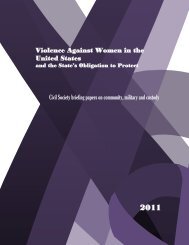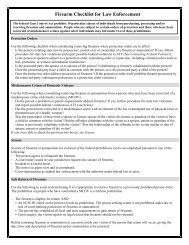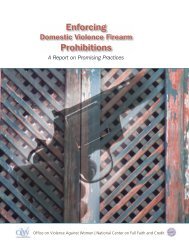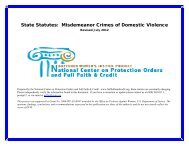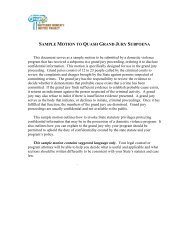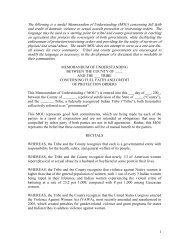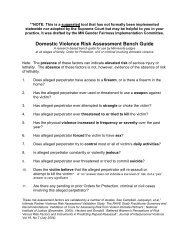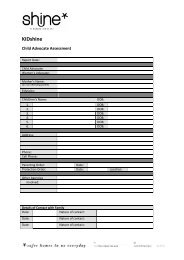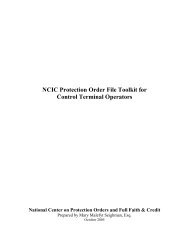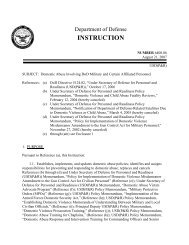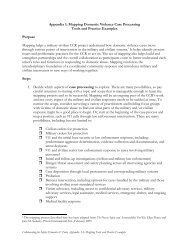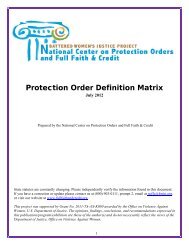Indian Child Welfare Act (ICWA)
Indian Child Welfare Act (ICWA)
Indian Child Welfare Act (ICWA)
You also want an ePaper? Increase the reach of your titles
YUMPU automatically turns print PDFs into web optimized ePapers that Google loves.
NCFFC CUSTODY TOOLS SERIES<br />
3/2004<br />
INTERSTATE CHILD CUSTODY<br />
A Practitioner’s Guide to the<br />
<strong>Indian</strong> <strong>Child</strong> <strong>Welfare</strong> <strong>Act</strong> (<strong>ICWA</strong>)<br />
25 U.S.C. § 1901 et. seq.<br />
WHAT TYPE OF LAW IS IT?<br />
The <strong>ICWA</strong> is a federal law.<br />
termination of parental rights cases stem from<br />
domestic violence. In these cases, <strong>Indian</strong> tribes have<br />
exclusive jurisdiction.<br />
WHY WAS IT ENACTED?<br />
The <strong>ICWA</strong> was enacted in 1978 to protect <strong>Indian</strong><br />
children and to promote the stability and security of<br />
<strong>Indian</strong> tribes and families. The law was drafted in<br />
response to the actions of state courts and child<br />
protective services agencies that were removing large<br />
numbers of <strong>Indian</strong> children from their families and<br />
placing them in non-<strong>Indian</strong> foster and adoptive<br />
homes. The <strong>ICWA</strong> was designed to prevent the<br />
unwarranted removal of <strong>Indian</strong> children from their<br />
families. When removal is necessary, the <strong>ICWA</strong><br />
helps ensure that <strong>Indian</strong> children retain ties to their<br />
culture and to the tribes with which the children are<br />
affiliated.<br />
HOW DOES IT WORK?<br />
The <strong>ICWA</strong> is a jurisdictional law. It establishes<br />
minimum federal standards for the removal of<br />
<strong>Indian</strong> children from their families and grants<br />
<strong>Indian</strong> tribes exclusive jurisdiction in specifically<br />
defined child custody proceedings.<br />
WHAT ARE THE SIGNIFICANT PROVISIONS<br />
RELATED TO DOMESTIC VIOLENCE?<br />
Definition of child custody proceedings<br />
Under the <strong>ICWA</strong>, child custody proceedings include<br />
foster care placement, termination of parental rights,<br />
preadoptive placement and postadoptive placement<br />
proceedings involving <strong>Indian</strong> children. While the<br />
<strong>ICWA</strong> does not address directly domestic violence,<br />
as a matter of practice, many foster care or<br />
Protection order proceedings and custody<br />
proceedings between two parents often<br />
involve domestic violence. The <strong>ICWA</strong> does<br />
not govern these types of proceedings.<br />
Some experts have suggested that while<br />
the <strong>ICWA</strong> does not govern custody and<br />
divorce cases generally, the <strong>ICWA</strong>’s<br />
principles of tribal sovereignty should be<br />
applied to such cases. See, e.g., Lesley M.<br />
Wexler, Tribal Court Jurisdiction in<br />
Dissolution Based Custody Proceedings,<br />
2001 U. Chi. Legal F. 613.<br />
Standard to terminate parental rights<br />
No termination of parental rights may be ordered<br />
absent a determination, supported by evidence<br />
beyond a reasonable doubt, including the testimony<br />
of qualified expert witnesses, that the continued<br />
custody of the child by the parent or <strong>Indian</strong><br />
custodian is likely to result in serious emotional or<br />
physical damage to the child.<br />
This provision may raise the issue of<br />
whether observing domestic violence is<br />
likely to “result in serious emotional or<br />
physical damage” to children.<br />
Prepared by the National Center on Full Faith and Credit<br />
Other tools in this series include case law summaries and concise summaries of the relevant statutes. For copies of these tools or for<br />
technical assistance, please call (800) 903-0111, prompt 2 or (703) 312-7922
<strong>ICWA</strong> Practitioner’s Guide PAGE 2<br />
Declining jurisdiction<br />
When a party in an <strong>Indian</strong> child custody proceeding<br />
before a state court has improperly removed the<br />
child from custody of the parent or <strong>Indian</strong> custodian<br />
or improperly retained custody, the court shall<br />
decline jurisdiction and return the child to the<br />
parent or <strong>Indian</strong> custodian unless returning the child<br />
would subject the child to a substantial and<br />
immediate danger or threat.<br />
Intersection with other child custody<br />
jurisdictional statutes<br />
The UCCJA does not address whether tribes should<br />
be considered states under the UCCJA and does not<br />
reference the <strong>ICWA</strong> (the UCCJA was enacted prior to<br />
the <strong>ICWA</strong>).<br />
The UCCJEA states explicitly that the UCCJEA does<br />
not apply to proceedings governed by the <strong>ICWA</strong>.<br />
Moreover, the UCCJEA gives states the option to<br />
extend the UCCJEA to custody determinations made<br />
by <strong>Indian</strong> tribal courts.<br />
Notice requirements<br />
When a state court knows or has reason to know that<br />
an <strong>Indian</strong> child is involved in a case, the party<br />
seeking the foster care placement or termination of<br />
parental rights shall notify the parent or <strong>Indian</strong><br />
custodian and the <strong>Indian</strong> child’s tribe. If they cannot<br />
be found, such notice shall be given to the Secretary,<br />
who shall have 15 days to provide the required notice<br />
to the parent or <strong>Indian</strong> custodian and to the tribe.<br />
No proceeding shall take place until at least 10 days<br />
after receipt of notice, with up to 20 additional days<br />
available upon request.


